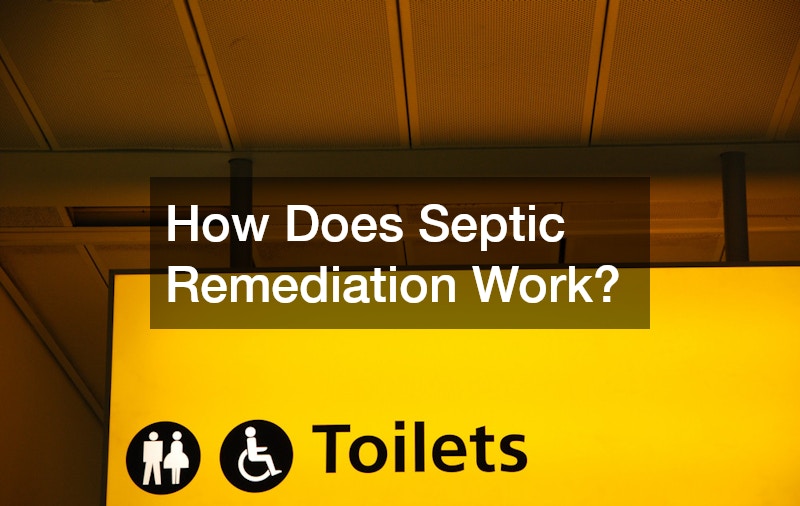Understanding septic remediation is essential for homeowners looking to maintain a healthy and efficient septic system. This guide covers the most frequently asked questions and important topics regarding septic remediation, providing a comprehensive look at how it works, when it’s needed, and how to manage it effectively.
Septic systems play a crucial role in managing household wastewater in areas without access to centralized sewer systems. When these systems malfunction or become overwhelmed, they pose serious health, environmental, and financial risks. Septic remediation acts as a lifeline, restoring compromised systems and extending their lifespan without the need for a full replacement. Whether you’re dealing with persistent plumbing issues, suspicious odors, or visible signs of drain field failure, understanding the basics of septic remediation is the first step in resolving the issue efficiently.
With input from experts in septic pumping, plumbing service, and hydro excavation, this guide explores everything from the early warning signs of system failure to the latest innovations in remediation technology. Whether you’re a seasoned homeowner or new to septic system maintenance, you’ll find practical advice, preventative tips, and insights on when to call in a professional—be it a septic company, local plumber, or excavating contractor. The goal is to equip you with the knowledge needed to protect your home, your health, and the environment through effective septic system management.
What is Septic Remediation?

Definition and Overview
Septic remediation refers to the process of restoring a failing or inefficient septic system to proper working condition. This process can involve biological, chemical, or mechanical interventions aimed at improving the function of the septic system without necessarily replacing the entire infrastructure.
Importance in Home Hygiene
A properly functioning septic system is critical to maintaining sanitary conditions in and around your home. Failing systems can lead to the spread of bacteria and other harmful pathogens, endangering your family’s health and contaminating the local environment. Regular septic pumping is essential to prevent system overload and avoid emergency remediation.
How it Differs from Regular Maintenance
Regular maintenance includes routine pumping, inspections, and Septic Tank Cleaning, whereas remediation is a corrective action for systems that are already exhibiting problems. It’s a more intensive process aimed at solving root issues rather than preventing them.
Common Triggers for Remediation
Septic systems may require remediation due to various reasons, such as poor drainage, foul odors, water pooling, or contamination of nearby water sources. Other common triggers include excessive water use, poor soil absorption, physical damage to the tank or drain field, or lack of regular septic pumping services.
Environmental Impact Considerations
Failing septic systems can leak untreated wastewater into the environment, contaminating groundwater and nearby surface water bodies. Septic remediation helps reduce these risks by restoring the system’s ability to treat wastewater properly.
Signs You Need Septic Remediation
Foul Odors and Sewage Backups
Unpleasant smells near your septic tank or in your home’s plumbing are a clear indicator that your system may be failing. Sewage backups in sinks, toilets, or bathtubs are urgent signs that remediation or immediate septic pumping may be needed.
Slow Drains and Pooled Water
If water drains slowly from your fixtures or you notice standing water near the drain field, it could point to blockages or a saturated field that can benefit from remediation efforts, possibly through hydro jetting service to clear clogs.
Unusually Lush Patches of Grass
Overly green or fast-growing areas of lawn above the drain field may signal that wastewater is surfacing and fertilizing the grass—an indication of septic system failure.
High Levels of Nitrate in Water Well
If you have a well and test results show high nitrate levels, your septic system might be leaching untreated waste into the groundwater, necessitating immediate remediation and professional plumbing service.
System Age and Wear
Older septic systems, particularly those 20 years or older, are more prone to failure due to wear and tear, outdated design, or changes in household usage. Consulting a reputable septic company or local plumber is advisable.
How Does Septic Remediation Work?

Initial Assessment Procedures
Remediation begins with a thorough inspection by a licensed professional. This includes checking tank levels, inspecting the drain field, and performing dye tests or soil percolation tests to identify the extent of the issue. Excavating contractors may be involved if physical access to buried components is needed.
Biological Treatment Methods
Biological treatments use bacteria and enzymes to break down waste and unclog drain fields. These treatments can rejuvenate soil absorption and reduce solid build-up in the tank.
Chemical Treatment Methods
Chemical remediation involves introducing substances like hydrogen peroxide or calcium-based compounds to restore permeability in the drain field. These should be handled carefully and only by professionals due to potential environmental risks.
Mechanical Processes Involved
Mechanical remediation may include jetting pipes using a hydro jetting service, replacing distribution boxes, or installing new drain field lines. In some cases, aeration, soil fracturing, or hydro excavation is used to improve drainage.
Post-Remediation Monitoring
After remediation, ongoing monitoring ensures that the septic system is functioning correctly. This might involve regular inspections, water quality testing, and usage adjustments.
Cost of Septic Remediation

Factors Influencing Cost
Costs vary based on the extent of the damage, the size and type of system, and the methods used for remediation. Soil type and accessibility also impact the overall cost. Labor from plumbers and excavating contractors can contribute significantly to pricing.
Average Cost Estimates
Homeowners can expect to pay between $1,000 and $10,000 for septic remediation, with simple treatments on the lower end and extensive mechanical repairs or partial replacements on the higher end.
Cost Differences: Repair vs. Replacement
Remediation is often significantly cheaper than full system replacement, which can cost upwards of $20,000. It provides a middle-ground solution for systems that are failing but still structurally intact.
Insurance Coverage Considerations
Homeowners insurance rarely covers septic system repairs unless the damage is due to a covered peril. However, some policies offer limited endorsements or add-ons.
Finding Affordable Services
Getting multiple quotes from septic pumping services, checking for local government grants, and working with licensed, insured professionals like a local plumber or certified septic company can help control costs without compromising quality.
DIY vs. Professional Septic Remediation
Understanding DIY Limitations
While minor maintenance like adding biological additives can be done by homeowners, most remediation work requires professional expertise due to health, safety, and legal considerations.
Pros and Cons of Hiring Professionals
Hiring a professional ensures compliance with regulations, proper diagnosis, and effective remediation. Septic pumping services and hydro excavation professionals come with the right tools and training. However, it can be more expensive than DIY methods.
Choosing the Right Approach for Your Situation
For minor issues, DIY approaches may suffice, but persistent or severe problems necessitate professional intervention to prevent escalation and legal liabilities.
Safety Concerns and Regulations
Working with septic systems involves exposure to hazardous waste. Professionals are trained in safety protocols and equipped with protective gear, making them a safer choice.
Tools and Equipment Required
Professional remediation may require jetting machines, soil probes, inspection cameras, and chemical injectors—tools that are generally inaccessible or impractical for homeowners.
Preventative Measures to Avoid Remediation
Regular Maintenance Tips
Pump your tank every 3–5 years using a trusted septic pumping service, schedule annual inspections, and keep accurate records. Avoid flushing non-biodegradable items and excess grease.
Avoiding Common System Overloads
Stagger laundry loads, install water-efficient fixtures, and fix leaks promptly to reduce the strain on your system. Consult a plumbing service for upgrades.
Environmentally Friendly Practices
Use biodegradable cleaning products and reduce chemical usage to maintain the bacterial balance within the system.
Effective Use of Septic Additives
Only use additives recommended by professionals. Some can improve microbial activity, while others may do more harm than good.
Landscaping Considerations around Septic Tanks
Avoid planting trees with invasive roots near the system. Maintain grass cover over the drain field to prevent erosion but avoid compacting the soil. When needed, excavating contractors can assist in relocating or upgrading landscaping features.
Environmental Concerns with Septic Systems
Impact on Groundwater Quality
Malfunctioning systems can leak nitrates, phosphates, and pathogens into the groundwater, posing health risks and ecological damage.
Effects on Local Ecosystems
Septic effluent can upset the nutrient balance in nearby streams and lakes, promoting algal blooms and harming aquatic life.
Pollution Prevention Strategies
Ensure regular maintenance, avoid overloading the system, and remediate issues promptly to minimize environmental harm.
Legal Regulations and Compliance
Local health departments often regulate septic systems, requiring permits for installation and remediation. Compliance ensures both safety and legality.
Innovations in Eco-Friendly Remediation
New technologies include advanced biofilters, aerobic treatment units, and constructed wetlands designed to improve treatment and minimize impact.
Advances in Septic Remediation Technology
Modern Biological Treatments
Today’s biological solutions use specialized bacterial strains to break down waste more efficiently, even in compromised environments.
Innovations in Chemical Solutions
New, less-toxic chemical options are available that enhance soil permeability without posing the environmental risks of older methods.
Mechanical Improvements and Tools
From trenchless pipe repair to high-efficiency jetting systems, mechanical advancements are making remediation faster and more effective.
Smart Septic Systems and Automation
Smart systems can monitor tank levels, flow rates, and issue alerts before problems arise, helping homeowners take preventative action.
Research and Development Highlights
Ongoing research aims to develop self-healing systems, biodegradable leach lines, and AI-powered diagnostics for early detection.
Choosing a Septic Remediation Service Provider
Key Considerations in Selection
Look for licensed and insured providers with a strong track record. Verify references and ensure they offer services appropriate to your system type, including septic pumping, hydro jetting, and plumbing service options.
Questions to Ask Potential Providers
Ask about their experience, methods used, expected timelines, and guarantees. Make sure they understand local regulations and provide services such as hydro excavation and Septic Tank Cleaning.
Licensing and Certification Requirements
Ensure providers are certified through state or national programs and comply with environmental regulations and building codes.
Evaluating Customer Reviews and Testimonials
Check online reviews, Better Business Bureau ratings, and personal recommendations to gauge the reliability and quality of service.
Negotiating Contracts and Warranties
Read the fine print, ask for detailed cost breakdowns, and ensure any warranties offered cover both parts and labor. Work with a reputable septic company or local plumber who provides transparent pricing.
Case Studies in Successful Septic Remediation

Residential Success Stories
In suburban areas, homeowners have successfully reversed system failure with biological treatments and improved system management. Some relied on local plumbers and septic pumping services for ongoing support.
Commercial and Industrial Applications
Larger systems serving businesses or multifamily housing units have benefited from high-capacity remediation solutions and customized treatment plans involving hydro excavation and mechanical upgrades.
Long-term Benefits Observed
Property value increases, reduced maintenance costs, and improved environmental compliance are common long-term benefits.
Challenges and Solutions Implemented
Case studies often highlight how early intervention, innovative methods, and consistent monitoring contributed to success. Hiring experienced excavating contractors and plumbing service professionals was often a key factor.
Lessons Learned from Real-Life Examples
Effective communication, realistic budgeting, and choosing qualified professionals—including plumbers and septic pumping service providers—are critical takeaways from successful remediation projects.
Closing Thoughts
Septic remediation is a vital process for maintaining the health and functionality of your septic system. As outlined in this guide, it encompasses a range of techniques—from biological and chemical treatments to advanced mechanical solutions—each tailored to address specific challenges in aging or failing systems. With the support of experienced professionals such as septic pumping services, local plumbers, and excavating contractors, homeowners can restore their systems effectively and avoid more extensive and expensive replacements.
Beyond addressing existing problems, understanding and implementing preventative measures like routine Septic Tank Cleaning, hydro jetting service, and regular inspections are key to minimizing the need for remediation in the first place. A proactive approach not only protects your investment but also contributes to public health and environmental sustainability.
With ongoing advancements in septic technology, including smart systems and eco-friendly treatment options, maintaining a reliable septic system has never been more attainable. Homeowners are encouraged to stay informed, engage with trusted service providers, and act promptly at the first signs of trouble. Whether you’re planning future maintenance or facing urgent repairs, having the right knowledge—and the right septic company or plumbing service on your side—makes all the difference.
In conclusion, septic remediation is more than just a fix—it’s an essential strategy for extending the life of your septic system, safeguarding your property, and ensuring the wellbeing of your household and community for years to come.

